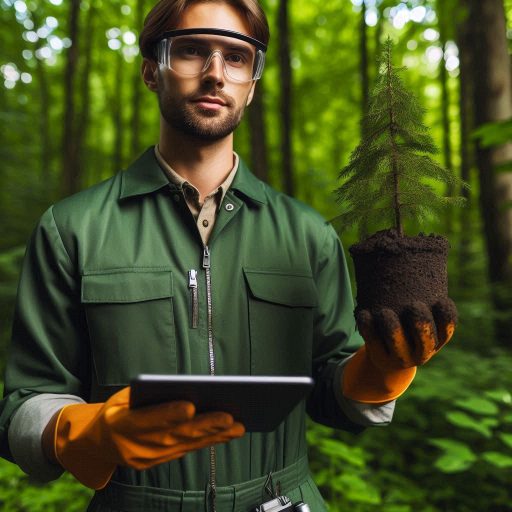Introduction
Environmental technicians play a vital role in monitoring and protecting the environment.
They are responsible for collecting and analyzing samples of air, water, soil, and other materials to ensure they meet environmental standards.
Their work involves identifying pollutants, assessing environmental damage, and supporting remediation efforts.
By providing critical data and insights, environmental technicians help organizations comply with regulations and implement sustainable practices that minimize environmental impact.
Networking is crucial for environmental technicians to succeed and grow in their careers.
Establishing professional connections can lead to job opportunities, collaborative projects, and access to the latest industry developments.
Through networking, technicians can engage with peers, mentors, and experts who provide valuable advice, share experiences, and offer career guidance.
Attending industry conferences, workshops, and joining professional associations allows technicians to stay informed about emerging technologies, regulatory changes, and best practices.
Networking also fosters collaboration, enabling technicians to work together on innovative solutions to environmental challenges.
By expanding their network, environmental technicians enhance their professional reputation, gain access to new resources, and increase their chances of career advancement.
In a field where staying updated is crucial, networking helps technicians remain competitive and effective in their roles.
Attend industry events and conferences
Importance of Networking Face-to-Face
In an increasingly digital world, face-to-face networking remains vital for environmental technicians.
It builds stronger relationships than online interactions.
Meeting in person fosters trust, allowing for more meaningful connections.
You can read body language and gauge reactions directly.
This personal touch often leads to lasting professional relationships.
Face-to-face networking also makes you more memorable to potential employers or colleagues.
You stand out from the crowd, leaving a lasting impression.
The energy and enthusiasm you convey in person can’t be fully replicated online.
Opportunities to Meet Professionals in the Field
Environmental conferences, workshops, and seminars are goldmines for networking opportunities.
These events gather industry professionals and experts, offering valuable face-to-face interactions.
Attending these events allows you to connect with like-minded individuals passionate about environmental work.
You can exchange ideas, learn about new trends, and discuss current challenges in the field.
Networking at these events often leads to job opportunities or collaborations on projects.
Don’t hesitate to introduce yourself and share your experiences with others.
You never know who might become a valuable contact or mentor.
Tips for Making Connections at Events
Preparation is key to effective networking at events.
Research the event and the attendees beforehand.
Know who you want to meet and what topics you want to discuss.
Arriving early gives you the chance to start conversations when the atmosphere is more relaxed.
Bring plenty of business cards to share with new contacts.
When introducing yourself, be concise and confident.
Share your name, your role, and what you‘re passionate about in the environmental field.
Ask open-ended questions to engage others in meaningful discussions.
Listen actively to what others have to say, showing genuine interest in their work.
After the event, follow up with the people you‘ve met.
A quick email or LinkedIn message can solidify the connection and keep the conversation going.
Be sure to mention something specific from your conversation to jog their memory.
Read: Top Surveying and Mapping Technician Employers
Join relevant online communities
Benefits of Networking Online for Environmental Technicians
Networking online offers environmental technicians several significant benefits.
First, it broadens your professional reach beyond geographical limitations.
You can connect with professionals across the globe.
This opens up opportunities to learn from diverse experiences and perspectives.
Online networking also allows you to stay updated on industry trends, research, and new technologies.
By engaging in online discussions, you can gain insights that might not be available in your local network.
Another advantage is the potential for career advancement.
Networking online can help you discover job opportunities or collaborations that align with your expertise.
Employers often use online platforms to identify potential candidates, so maintaining an active presence can enhance your visibility.
Moreover, online networking facilitates the sharing of resources, such as articles, webinars, and industry reports, which can further your professional development.
Platforms for Environmental Technicians to Connect
Several online platforms are ideal for environmental technicians to build connections.
LinkedIn is one of the most effective platforms for professional networking.
It allows you to connect with industry experts, join groups, and participate in discussions related to environmental science and technology.
LinkedIn also provides a space to showcase your skills, experience, and accomplishments, helping you to attract potential employers or collaborators.
Another valuable platform is ResearchGate, which caters specifically to researchers and academics.
Environmental technicians can use ResearchGate to share their research, follow others’ work, and engage in scientific discussions.
This platform is particularly useful for those involved in environmental research or interested in staying updated with the latest studies.
Additionally, specialized forums like the Environmental Science Forum or Reddit‘s environmental science communities offer spaces for more casual, yet informative, interactions.
These platforms allow you to ask questions, share knowledge, and engage in discussions with like-minded professionals.
The ability to connect with a diverse group of individuals in these forums can lead to fruitful collaborations and partnerships.
How to Engage with Others in Online Communities
Engaging effectively in online communities requires both initiative and consistency.
Start by creating a complete and professional profile on your chosen platforms.
This includes a clear photo, a concise bio, and detailed information about your skills and experience.
A well-crafted profile helps others understand your expertise and encourages them to connect with you.
Once your profile is set, begin by joining relevant groups or forums.
Actively participate in discussions by sharing your insights, asking questions, and providing thoughtful responses.
Engaging regularly will help you establish yourself as a valuable member of the community.
Also, don’t hesitate to reach out directly to individuals whose work interests you.
A polite message expressing your interest in their work or offering to collaborate can lead to meaningful connections.
Remember, online networking is about building relationships, so be patient and persistent in your efforts.
Over time, your engagement will yield valuable connections and opportunities in the environmental field.
Read: Safety Tips for Field Surveying Technicians
Utilize social media for networking
The Importance of a Professional Online Presence
In today’s digital age, having a professional online presence is crucial for environmental technicians.
A well-crafted online profile increases your visibility and credibility in the industry.
When potential employers or collaborators search for you online, your professional image should reflect your skills and expertise.
This online presence isn’t just about having a profile; it’s about showcasing your value and standing out in the competitive environmental sector.
A strong online presence also ensures that you’re part of important conversations and networks in your field.
Networking on Platforms Like LinkedIn
LinkedIn is a powerful tool for environmental technicians looking to expand their professional network.
By connecting with other professionals, you can access new opportunities, insights, and industry trends.
Start by optimizing your LinkedIn profile with a professional photo, a compelling headline, and a summary that highlights your expertise and passions.
Join relevant LinkedIn groups focused on environmental topics, and engage in discussions by commenting on posts or sharing insightful content.
These interactions help you build relationships and increase your visibility within the environmental community.
How to Showcase Expertise
Showcasing your expertise online is key to establishing yourself as a thought leader in the environmental field.
Use LinkedIn‘s features to highlight your skills, certifications, and accomplishments.
Regularly post articles or updates related to your work or industry trends.
This not only demonstrates your knowledge but also keeps you active and visible on the platform.
Consider creating or sharing content that addresses common challenges in environmental work, offering solutions or new perspectives.
This approach shows that you‘re not just knowledgeable but also innovative and proactive.
Read: Recent Trends in Surveying and Mapping Technologies

Building relationships with colleagues and mentors
Importance of building a strong professional network
Building a strong professional network is essential for environmental technicians.
A solid network connects you to opportunities and resources.
It also keeps you informed about industry trends and best practices.
Additionally, networking can help you gain visibility in the field, leading to career growth.
Networking is not just about meeting people.
It‘s about forming meaningful connections that can offer mutual benefits.
Strong relationships within your professional circle can open doors to new job opportunities.
Moreover, they can provide you with a support system for solving complex challenges in your work.
A strong network allows you to share ideas, collaborate on projects, and stay updated on new technologies.
As an environmental technician, being well-connected ensures you‘re never isolated.
Instead, you‘re always part of a community that shares your professional interests and goals.
How to Cultivate Relationships with Coworkers and Mentors
Start cultivating relationships by being approachable and engaging with your coworkers regularly.
Show interest in their projects and offer help when needed.
A willingness to assist can create a positive impression and lay the foundation for a strong relationship.
Engage in open communication with your colleagues.
Clear, honest communication fosters trust, which is crucial for building lasting professional relationships.
Make time for regular check-ins with your coworkers to discuss ongoing projects and share insights.
Seek out mentors within your organization who can guide your career development.
Mentors can offer valuable advice and help you navigate challenges.
Approach potential mentors with specific questions or seek their opinions on your work.
This shows that you value their expertise and are serious about learning.
Be respectful of their time by scheduling meetings in advance and preparing your questions.
Consistency is key when building relationships.
Regularly touch base with both coworkers and mentors to maintain and strengthen these connections.
Tips for Seeking Advice and Guidance from Experienced Professionals
When seeking advice, be clear and concise about what you need.
Experienced professionals are more likely to help when you‘re specific in your requests.
Clearly state the problem or the area where you need guidance.
Show appreciation for their time and insights.
A simple thank-you can go a long way in maintaining a positive relationship.
Always follow up on the advice given and share the results with them.
This feedback shows that you value their input and are willing to act on it.
Networking events and professional associations are excellent places to connect with experienced professionals.
Attend these events and actively participate in discussions.
Don’t be afraid to introduce yourself and ask for advice.
Most professionals are willing to help if approached respectfully and with genuine interest.
By building and nurturing these relationships, you‘ll create a supportive network that can propel your career forward.
Read: Networking Tips for Surveying and Mapping Professionals
Volunteer for environmental causes and organizations
Benefits of Networking Through Volunteering
Volunteering offers a unique platform for environmental technicians to expand their professional networks.
Engaging in volunteer activities allows you to connect with people who share your passion for environmental conservation.
These connections often lead to new opportunities and valuable insights into the industry.
When you volunteer, you naturally meet individuals who care about the environment as much as you do.
These shared interests create a strong foundation for meaningful professional relationships.
Opportunities to Meet Like-Minded Individuals
Volunteering provides a gateway to meet like-minded individuals in the environmental sector.
When you participate in environmental clean-ups, conservation projects, or educational outreach, you are surrounded by people who share your goals.
These shared experiences often lead to lasting connections.
The individuals you meet through volunteering are likely to become valuable contacts.
They can provide advice, mentorship, or even job referrals in the future.
By surrounding yourself with passionate individuals, you can learn from their experiences and expand your knowledge.
This exposure to different perspectives can significantly enhance your approach to environmental work.
Additionally, many volunteer organizations host events, workshops, and seminars where you can interact with professionals in the field.
These settings offer an excellent opportunity to introduce yourself, exchange ideas, and establish connections.
How to Leverage Volunteer Experience for Networking Purposes
Leverage your volunteer experience by showcasing it in your professional network.
Start by updating your LinkedIn profile to include your volunteer activities.
Highlight the skills you’ve gained and the projects you’ve contributed to.
This information can attract attention from potential employers or collaborators who value community involvement.
When attending networking events, mention your volunteer work in conversations.
Discuss the impact you’ve made and the connections you’ve formed.
Volunteering also provides opportunities to develop leadership skills, which can be appealing to potential employers.
If you’ve organized a volunteer event or led a project, make sure to mention this in professional settings.
These experiences demonstrate your initiative, teamwork, and commitment to environmental causes.
Sharing stories about your volunteer experiences can make you stand out in interviews or networking events.
People appreciate individuals who go beyond their job responsibilities to make a difference.
Moreover, volunteering can open doors to formal job opportunities.
Many organizations prefer to hire individuals who have already demonstrated their dedication through volunteer work.
This gives you a chance to transition from volunteer roles to paid positions within the same organization.
Therefore, treat every volunteer opportunity as a stepping stone in your career.
Transform Your Career Today
Unlock a personalized career strategy that drives real results. Get tailored advice and a roadmap designed just for you.
Start NowDiscover More: Building a Strong Portfolio as a Geotechnical Engineer
Attend workshops and training sessions
Importance of Continuing Education for Networking
Continuing education is vital for environmental technicians aiming to advance their careers.
By regularly enhancing your skills, you stay competitive and informed.
Engaging in ongoing learning opportunities also opens doors to valuable networking prospects.
These educational environments bring together professionals who share common interests and goals.
As you expand your knowledge, you also expand your professional circle.
Meeting like-minded individuals in a learning environment often leads to collaborations and career growth.
In these settings, you encounter experts, peers, and mentors who can provide guidance and opportunities.
These connections are crucial for career advancement, as they often lead to job opportunities and industry insights.
Networking in an educational setting fosters relationships built on shared learning experiences, making them more meaningful and lasting.
Opportunities to Meet Professionals in a Learning Environment
Workshops and training sessions provide excellent opportunities to meet industry professionals.
These events are designed to enhance your skills and knowledge.
By attending, you place yourself in the company of individuals who are equally committed to their professional growth.
This common ground fosters mutual respect and trust, laying a solid foundation for networking.
Educational events often feature expert speakers and industry leaders.
Interacting with these professionals allows you to gain insights into industry trends and best practices.
Moreover, these events frequently include networking sessions, where you can engage in meaningful conversations with other attendees.
These interactions often lead to long-term professional relationships, which are invaluable for career development.
Tips for Making Lasting Connections at Workshops and Training Sessions
To make the most of networking opportunities at workshops and training sessions, preparation is key.
Start by researching the event and identifying key speakers and attendees.
Having background knowledge about the participants can help you engage in more meaningful conversations.
During the event, be proactive and approachable.
Introduce yourself to others and show genuine interest in their work.
Ask insightful questions and share your experiences, making sure to listen actively.
Building rapport is essential for making a lasting impression.
Follow-up is crucial for maintaining the connections you make.
After the event, reach out to the people you met via LinkedIn or email.
Express your appreciation for the conversation and suggest ways to stay in touch.
Offering to share resources or continue a discussion can also strengthen the relationship.
Attending workshops and training sessions regularly ensures that you maintain a robust professional network.
Each event is an opportunity to meet new people and deepen existing connections.
By consistently engaging in continuing education, you not only enhance your skills but also build a network that supports your career growth.
Remember, networking is an ongoing process that requires effort, but the rewards are significant.
Conclusion
Networking is essential for environmental technicians to advance their careers and achieve success.
Building strong professional connections opens doors to job opportunities and collaborations.
By networking, you gain access to industry insights, new technologies, and best practices.
Engaging with peers and experts enhances your knowledge and keeps you updated on environmental trends.
Networking also helps you find mentors who can guide your career development.
These relationships provide valuable advice and support as you navigate challenges in your field.
By staying connected with other professionals, you expand your influence and visibility in the industry.
This increased recognition can lead to promotions, partnerships, or even new roles.
Take advantage of networking events, online forums, and professional organizations to grow your network.
Be proactive in reaching out to others, sharing your experiences, and offering help.
Building these connections now will pay off in the long run.
Remember, your network is a powerful tool that can propel your career forward.
So, invest time in networking and apply these tips consistently.
Your career growth and success depend on the relationships you build and maintain.
Don‘t underestimate the power of a strong professional network in achieving your career goals.




